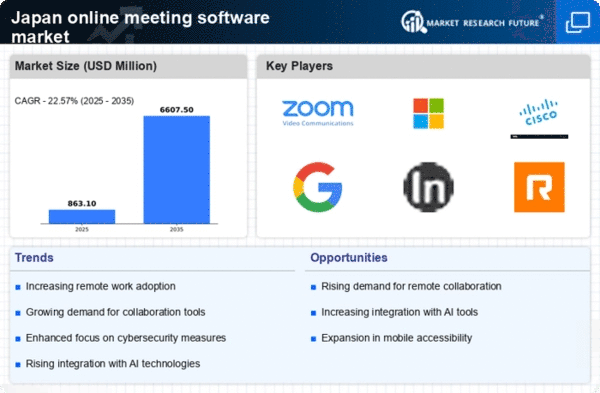Growing Importance of User Experience
User experience is emerging as a critical factor in the online meeting-software market in Japan. As users become more discerning, software providers are focusing on creating intuitive interfaces and enhancing usability. Research shows that approximately 75% of users prioritize ease of use when selecting online meeting tools. This trend is prompting companies to invest in user-centric design, ensuring that their platforms are accessible and efficient. By prioritizing user experience, providers can differentiate themselves in a crowded market, potentially leading to increased customer loyalty and retention. As the demand for user-friendly solutions grows, the online meeting-software market is likely to evolve accordingly.
Rising Demand for Remote Collaboration
The online meeting-software market in Japan experiences a notable surge in demand for remote collaboration tools. As organizations increasingly adopt flexible work arrangements, the need for effective communication solutions becomes paramount. Recent data indicates that approximately 70% of Japanese companies have implemented remote work policies, driving the adoption of online meeting software. This trend is further supported by the growing number of freelancers and remote workers in Japan, which has increased by 30% over the past two years. Consequently, the online meeting-software market is poised for growth as businesses seek to enhance productivity and maintain connectivity among dispersed teams.
Shift Towards Cost-Effective Solutions
Cost considerations are becoming increasingly relevant in the online meeting-software market in Japan. Businesses are actively seeking cost-effective solutions that provide value without compromising on quality. The competitive landscape has led to a proliferation of affordable online meeting platforms, catering to small and medium-sized enterprises (SMEs) that may have limited budgets. Recent surveys indicate that approximately 50% of SMEs in Japan prioritize cost when selecting meeting software. This shift towards budget-friendly options is likely to drive innovation and competition within the market, as providers strive to offer attractive pricing models while maintaining high service standards.
Technological Advancements in Connectivity
Technological advancements play a crucial role in shaping the online meeting-software market in Japan. The proliferation of high-speed internet and 5G technology enhances the user experience by enabling seamless video conferencing and real-time collaboration. Reports suggest that Japan's internet penetration rate stands at around 95%, facilitating widespread access to online meeting platforms. Furthermore, the integration of advanced features such as virtual backgrounds and screen sharing capabilities enhances user engagement. As these technologies continue to evolve, they are likely to drive further adoption of online meeting software, catering to the needs of both businesses and individual users.
Increased Focus on Training and Development
the online meeting software market in Japan is influenced by the growing emphasis on training and development within organizations.. Companies are increasingly recognizing the importance of continuous learning and skill enhancement, leading to a rise in virtual training sessions. Data indicates that approximately 60% of Japanese firms have adopted online training programs, utilizing meeting software to facilitate interactive learning experiences. This trend not only boosts employee engagement but also contributes to the overall effectiveness of training initiatives. As organizations invest in employee development, the demand for robust online meeting solutions is expected to rise, further propelling market growth.

















